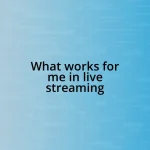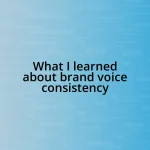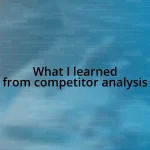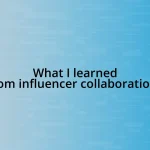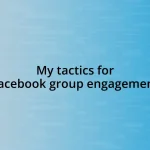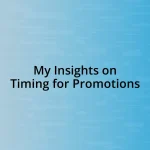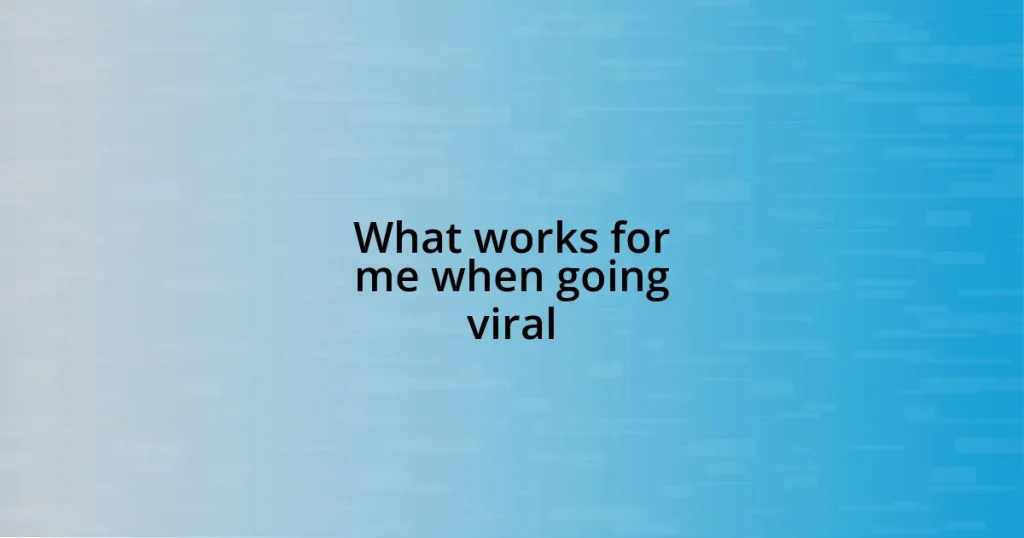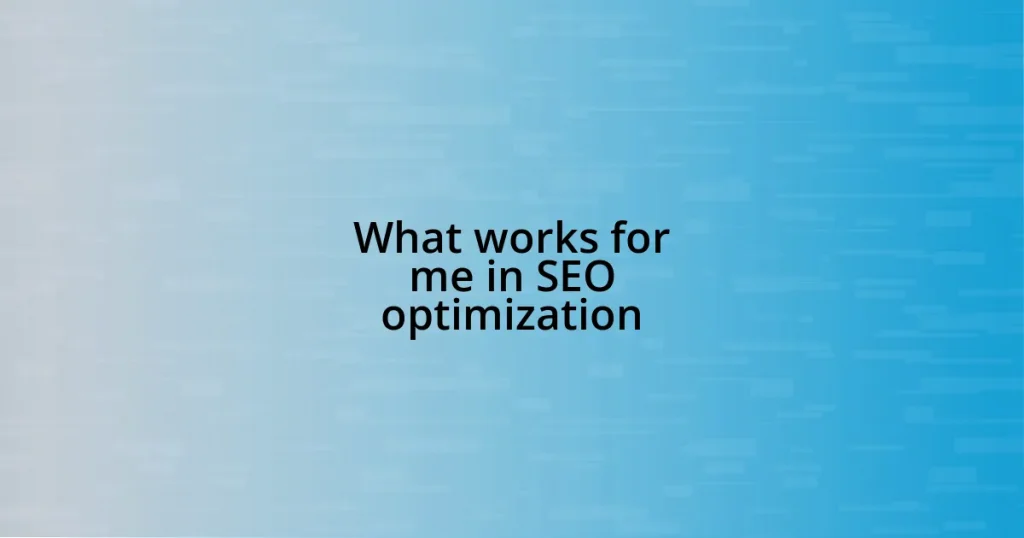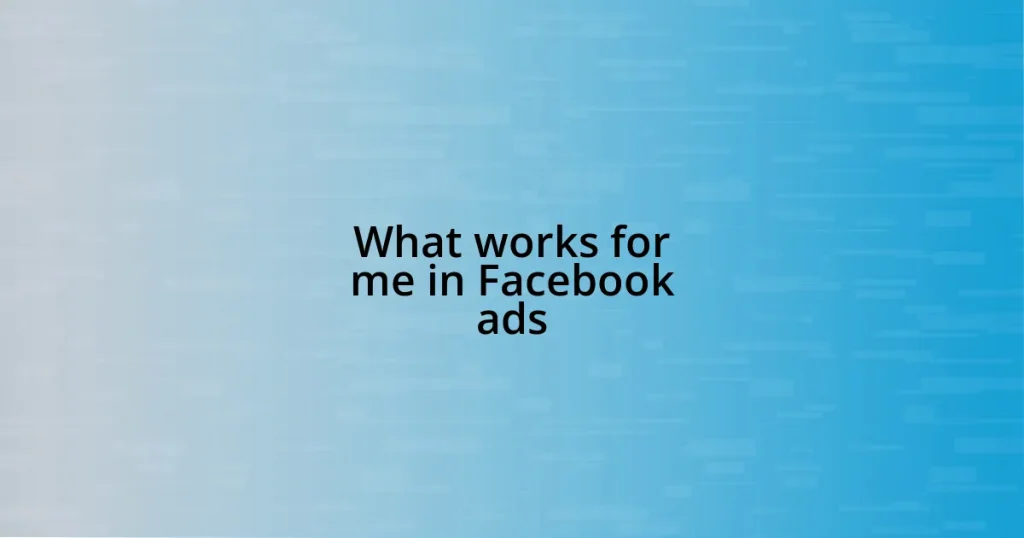Key takeaways:
- Collaborating with DJs enhances creativity and expands audiences through the fusion of different musical influences.
- Finding the right DJ partner requires assessing musical compatibility, experience, professionalism, and shared vision.
- Establishing clear communication and mutual goals fosters a more enjoyable and productive collaboration experience.
- Utilizing social media for promotion and engaging with the audience can amplify the success of collaborative projects.
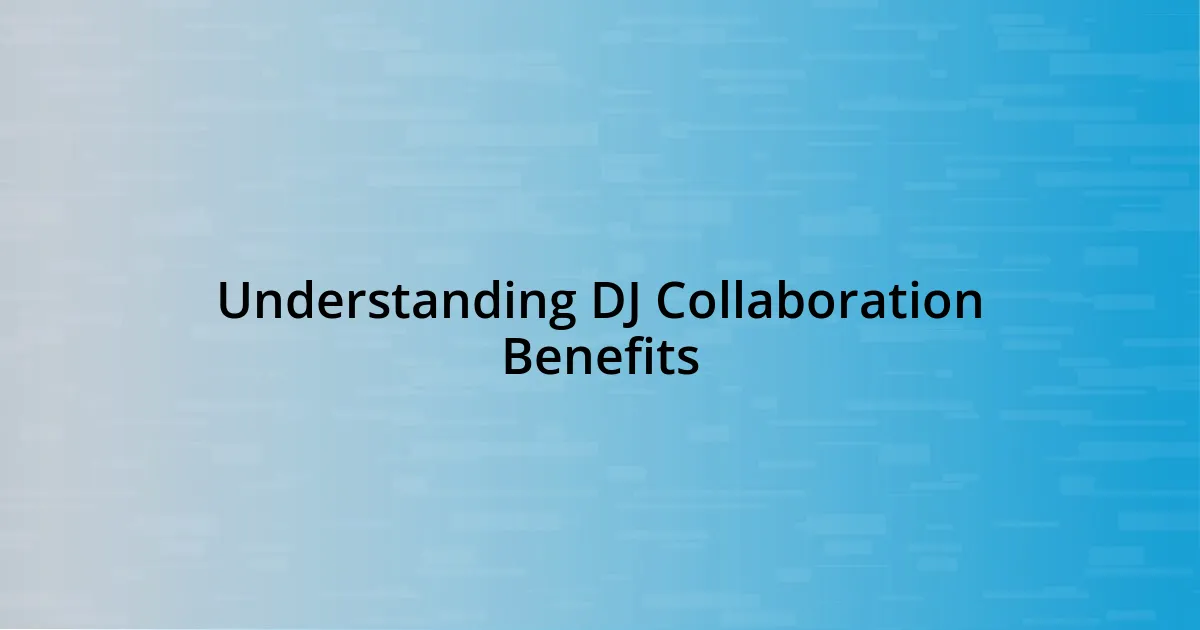
Understanding DJ Collaboration Benefits
Collaborating with DJs can elevate your music to new heights—not just in sound but in reach. I remember when I teamed up with a local DJ for an event. Mixing our styles created an unexpected energy that caught everyone’s attention, proving that unity can spark something truly special. Have you ever experienced that moment when the crowd feels completely connected through music?
The beauty of collaboration lies in the fusion of different influences. When I worked alongside a DJ known for blending genres, I found my own musical boundaries expanded. It felt exhilarating to explore sounds I had never considered before. This synergy not only enhances creativity but also helps both parties tap into each other’s fan bases, broadening our audiences.
Additionally, there’s something uniquely motivating about working with someone who shares a passion for music. I cherish those late-night jam sessions where ideas flow freely, and there’s this palpable excitement in the air. The shared experiences and feedback can help refine one’s craft, making collaboration a deeply rewarding emotional journey. What better way to grow as an artist than alongside a like-minded collaborator?
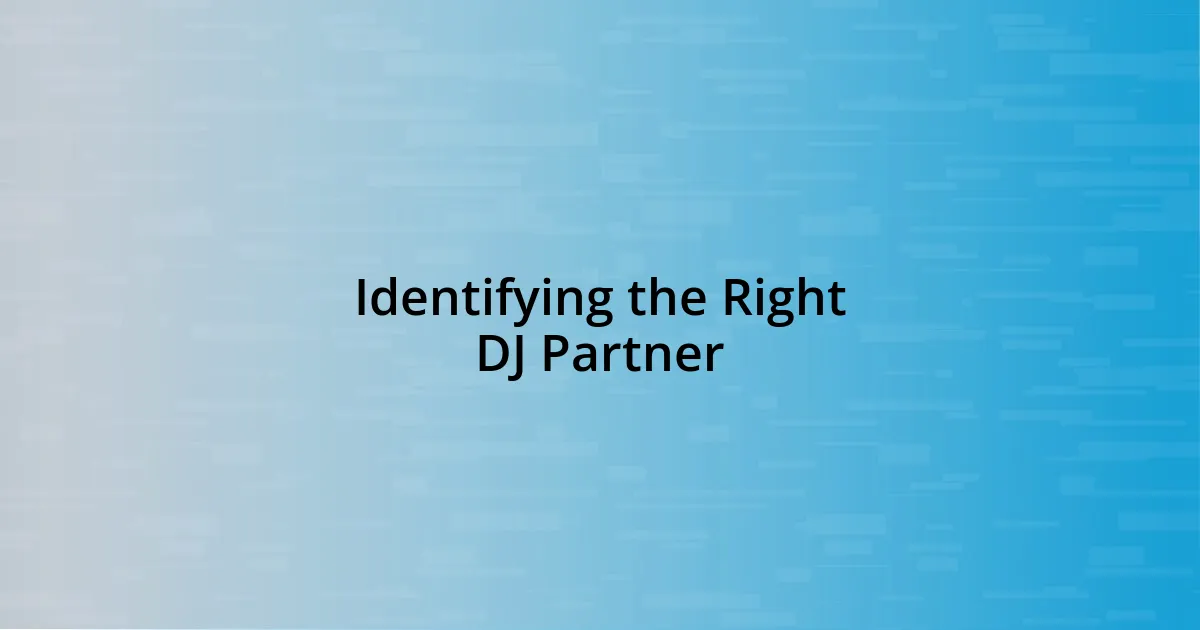
Identifying the Right DJ Partner
Finding the right DJ partner is a crucial step in ensuring a successful collaboration. I’ve learned that chemistry can make or break a project. On one occasion, I reached out to a DJ who had an impressive profile, but when we started chatting, the vibe just wasn’t there. It taught me that shared vision and respect for each other’s artistry lay the groundwork for a fruitful partnership.
Here are some things I consider when identifying the right DJ to work with:
- Musical Compatibility: Look for someone whose musical taste aligns with yours.
- Experience and Skill: Assess their previous gigs and mixes to ensure they have the proficiency needed.
- Professionalism: A good professional attitude is essential for a smooth collaboration.
- Open Communication: Can you easily discuss ideas and feedback? This mutual respect is vital.
- Shared Audience: A DJ who attracts a similar fan base can help expand your reach.
- Creative Vision: Find someone who’s as excited about innovative concepts as you are.
Engaging in this process prevents mismatches that can lead to tension or underwhelming results. I’ve had collaborations that fell flat, simply because I overlooked the importance of these factors. It’s about building a connection, both musically and personally, that can lead to something extraordinary.
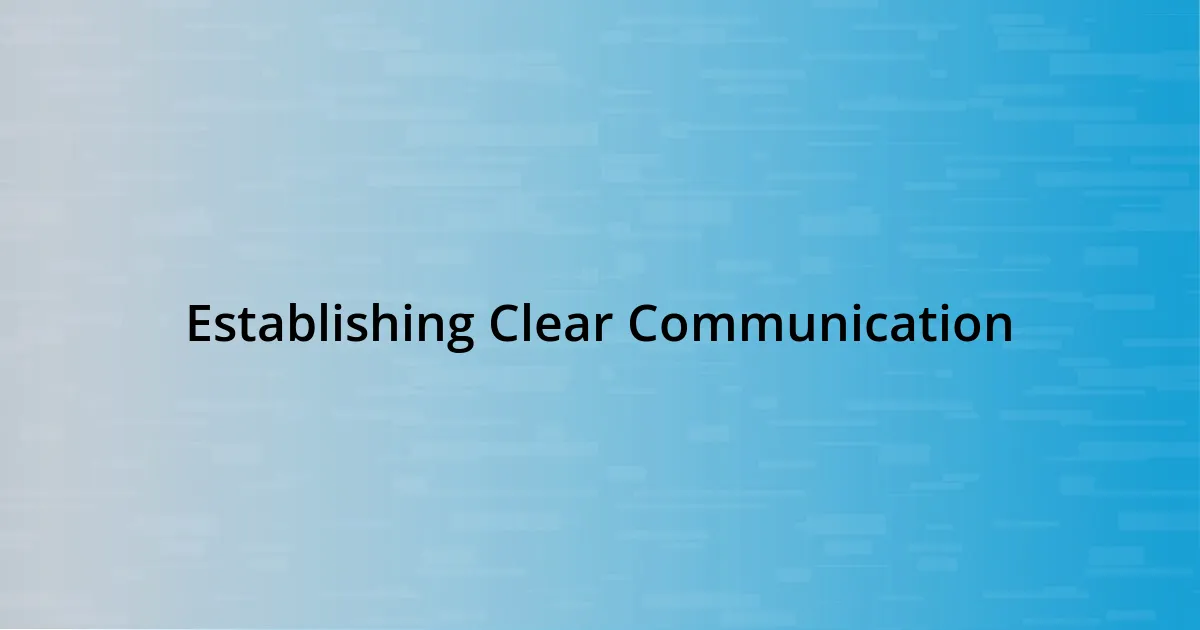
Establishing Clear Communication
Establishing clear communication is foundational in any collaboration, especially with DJs. I remember a time when I was all set to record with a DJ and we had different interpretations of the vibe we wanted. It was only after a candid and open conversation that we aligned our visions, resulting in a project that truly reflected both of our styles. Have you ever felt the relief when misunderstandings are cleared up through honest discussion? It’s an amazing feeling.
Beyond just sharing ideas, setting expectations upfront makes a world of difference. For example, I always ensure we discuss our goals, deadlines, and preferred methods of feedback right from the start. I can’t stress enough how enjoyable it is to work with someone who respects my input and encourages open dialogue. This clarity not only keeps the project on track but also fosters a sense of team spirit, making the process much more enjoyable.
To further illustrate, here’s a quick comparison of communication styles. I’ve noticed that varying approaches can impact the collaboration dramatically. Personally, I’ve found that a balanced mix of professionalism and friendliness yields the best results.
| Communication Approach | Outcome |
|---|---|
| Casual Conversations | Encourages creativity but may lack direction |
| Formal Discussions | Provides structure but might stifle creativity |
| Regular Check-Ins | Maintains clarity and engagement |
By blending these approaches, I’ve learned that we can remain flexible while also honoring our commitment to the project. Clear, open lines of communication can transform an ordinary collaboration into an extraordinary sonic adventure.
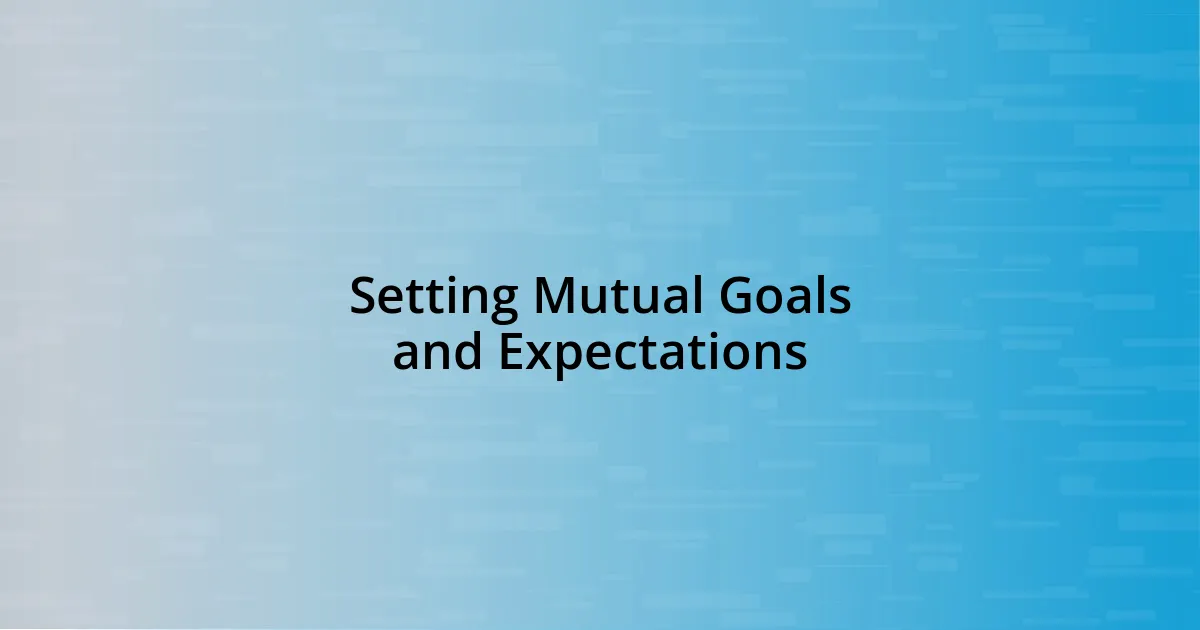
Setting Mutual Goals and Expectations
Setting mutual goals and expectations is essential for any collaboration. I recall a collaboration where we sat down to outline what we both wanted from the project. It turned into a refreshing brainstorming session. I felt energized as we shared our aspirations; mapping out our vision helped solidify our direction. Have you ever found clarity through shared dreams? It’s a transformative experience.
When I work with a DJ, I make sure to define specific goals like track releases, promotional timelines, and even the type of vibe we want to create. This kind of precision not only keeps us focused but also builds a sense of accountability. I remember on one project, we agreed on a release date early on. That simple act kept both of us in sync and motivated! It’s amazing how a clear objective can fuel your creativity.
In my experience, being transparent about expectations also means discussing what each of us can bring to the table. For instance, I once collaborated with a DJ who handled social media promotion while I focused on creating music. This division of roles helped streamline our efforts and maximized our strengths. Don’t you think there’s something really powerful about having a shared roadmap? When everyone knows their part, it doesn’t just elevate the project; it transforms the entire collaboration experience.
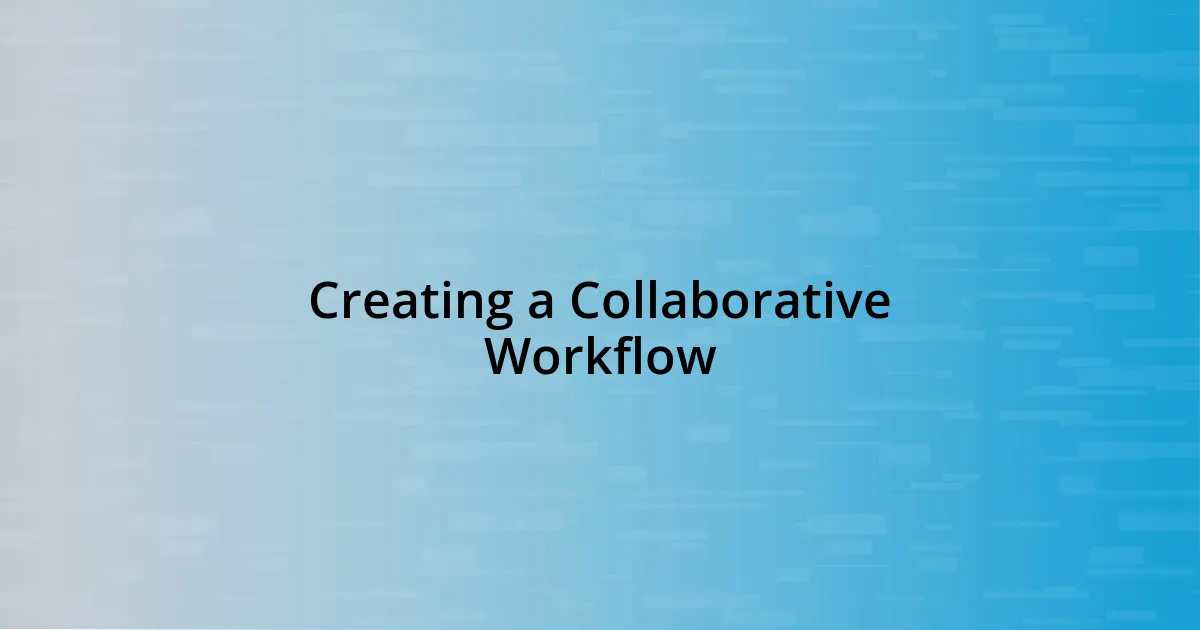
Creating a Collaborative Workflow
Creating a collaborative workflow is all about flow and flexibility, which I’ve found to be vital when working with DJs. I remember a time when we had a jam session where the ideas were spilled out like an overflowing cup of coffee. That spontaneous energy allowed us to explore different sounds and vibes, resulting in a unique track that neither of us anticipated. Have you ever tapped into that kind of creative spontaneity? It’s exhilarating!
In my experience, utilizing project management tools can really enhance our workflow. For instance, I use platforms like Trello to visually map out our tasks and deadlines. This way, I can see who’s responsible for what at a glance. It’s fascinating how a simple tool can keep everything organized; it’s like having a clear map for a road trip without detours!
I’ve also learned that checking in regularly—even if it’s just a quick text—keeps the momentum going. On one collaborative project, I initiated weekly catch-ups just to touch base. Those brief chats often sparked new ideas and reminders about our upcoming milestones. The consistency reminds me of the importance of rhythm in music; when you hit that beat together, everything flows seamlessly. What techniques have you found useful in maintaining that collaborative groove?
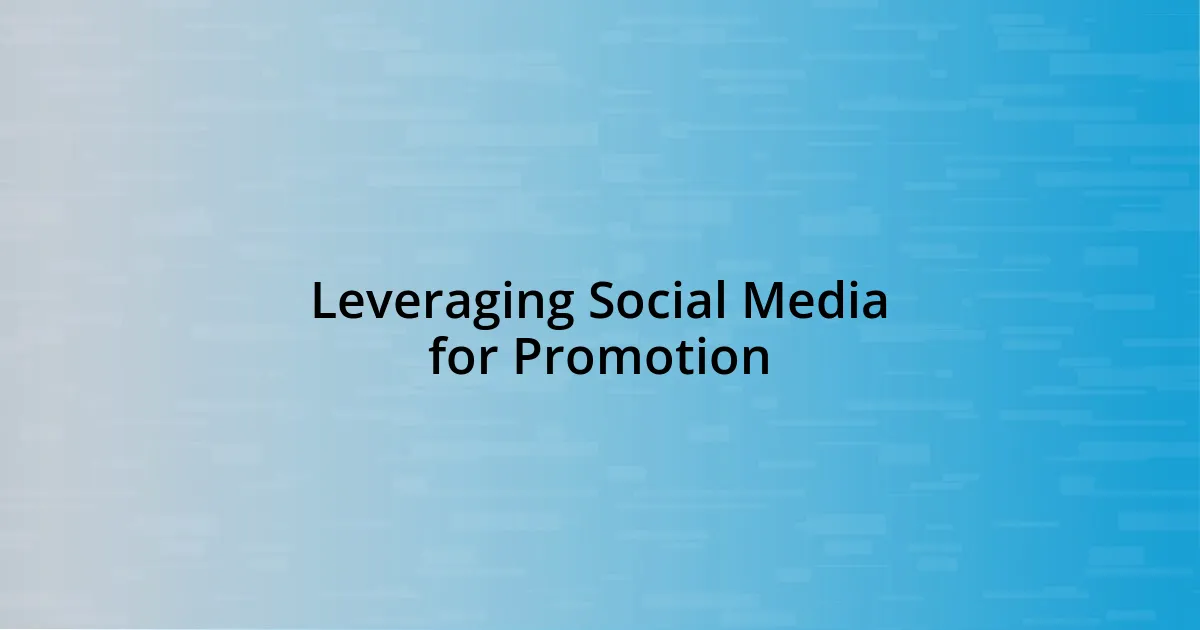
Leveraging Social Media for Promotion
Social media has become an indispensable tool for promotion, and I’ve found it to be a game changer in my collaborations with DJs. I remember when we launched a new track; we decided to create teaser content for platforms like Instagram and TikTok. It was thrilling to see how swiftly our audience engaged with the snippets, asking questions and sharing their excitement. Have you ever watched your ideas come to life in a beautiful way online? It’s a rush that can’t be understated.
In my experience, forming a strong social media strategy together amplifies our message. Once, I suggested we host a live Q&A session before our album release, which allowed fans to interact with us directly. The anticipation built the hype and genuinely deepened our connection with our audience. Isn’t it fascinating how a simple idea can morph into something spectacular? It reminds me that collaboration is not just about the music; it’s about crafting an experience for everyone involved.
Moreover, engaging with our followers through consistent posts and promotions fosters community. I recall a time when we ran a contest for our listeners to remix one of our tracks; the submissions rolled in, and the talent on display blew us away! There’s something profound about turning our promotional efforts into a two-way street, isn’t there? It truly makes the whole journey enjoyable and inclusive, making fans feel like they’re a part of our story.
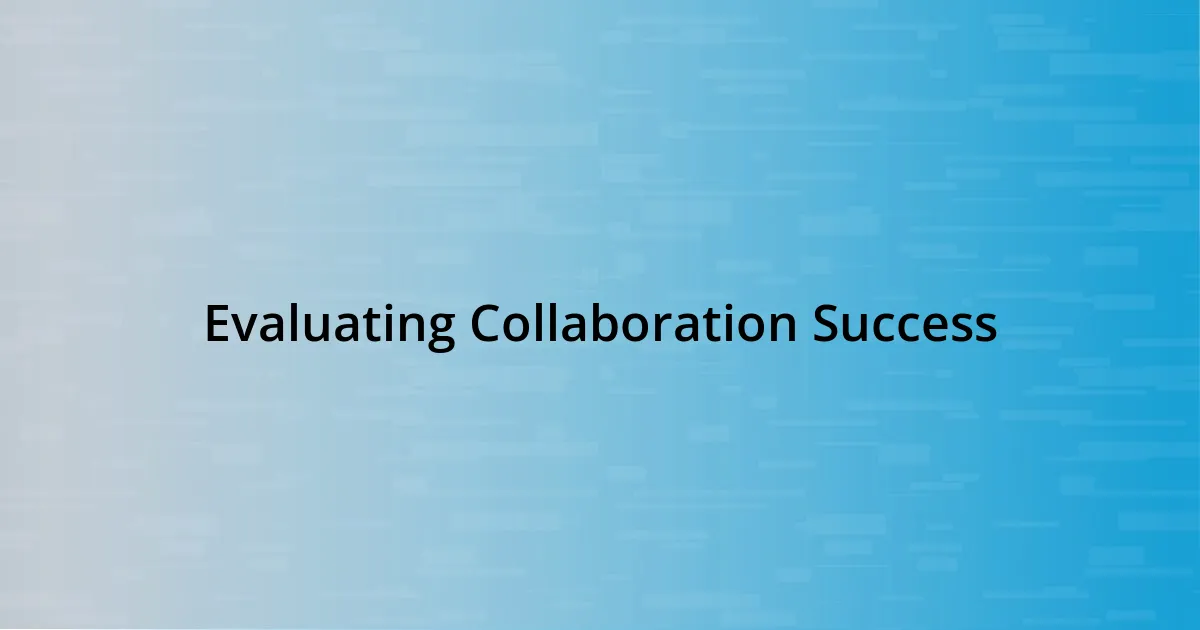
Evaluating Collaboration Success
Evaluating collaboration success always requires a blend of reflection and tangible metrics. I often consider feedback from both artists and our audience as crucial indicators. For example, after releasing a joint project, I take time to analyze the comments and reactions we received. It’s fascinating to see how different perspectives can reveal the strengths and weaknesses of our efforts. Have you ever noticed how a simple comment can spark a deeper understanding of a project’s impact?
Beyond just feedback, I look at performance metrics like streaming numbers and social media engagement. One time, I collaborated on a track that initially seemed to underperform, but a few months later, it started gaining traction thanks to a viral trend. That moment taught me that success might not always be immediate. Isn’t it interesting how the music landscape can shift in unexpected ways, reminding us to be patient and vigilant?
Lastly, I’ve discovered the value of post-project debriefs. After one particular collaboration, we gathered to discuss our experiences and what we could improve next time. This session not only highlighted areas for growth but also reignited our passion for future projects. It made me realize that evaluating success isn’t just about numbers; it’s about the relationships and knowledge we build along the way. Have you ever sat down with your collaborators to share experiences? It can be a rewarding exercise that deepens connections.





